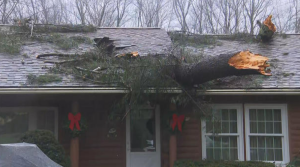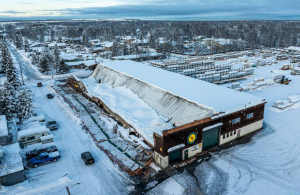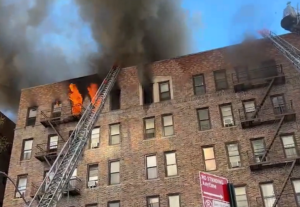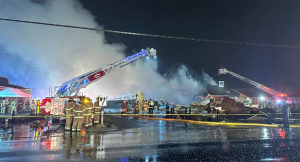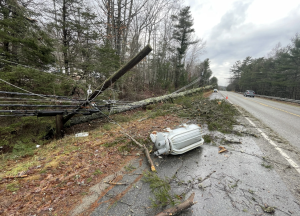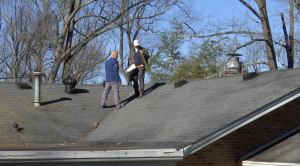
The temporary truce that began between Israel and Hamas on November 24, was extended twice and ended today. Gaza is now awash with violence, causing Palestinians to be terrified.
UN has described the end of the temporary ceasefire and the return of violence between Israel and Hamas as the “nightmare that everyone feared”.
Israel resumed its bombing of the Gaza Strip today after the ceasefire expired. The renewed clashes, according to James Elder, Unicef’s spokesman are “catastrophic” for Gazans. From a hospital near Khan Younis in Gaza’s southern part, James Elder reported that there had been a nearby strike, ambulances were at the site and smoke plumes could be seen in the skies.
Nasser Hospital is “overflowing” with people who have war wounds and children recovering after the recent attack, he said. He said that families have been sleeping in mattresses for several weeks at Nasser Hospital after they were displaced by Israeli air strikes.
According to Mr Elder, he told Newsday on BBC: “This hospital can’t possibly handle a sudden surge of wounds from the battlefront with children suffering burns and shrapnel injury.” Israel Defense Forces said that Hamas opened fire on Israel Friday morning. This was a violation of the agreement for a temporary ceasefire and led to a resumption in hostilities.
IDF leaflets warned people that Khan Younis was a dangerous combat zone and encouraged them to move further south. Many of the hundreds of thousands who fled the northern Gaza Strip earlier in this war took refuge in Khan Younis, and in other areas in the South.
Gaza is now almost entirely confined to the southern part of Gaza, with no way out. This raises questions about how Israel can conduct an offensive without causing heavy casualties among civilians. On Friday, one of the initial airstrikes destroyed a huge building in Khan Younis.
Residents were then seen searching frantically for survivors in the rubble as medics approached. A wounded victim was transported on a stretcher. A strike in Hamad City near the city hit an apartment of a residential multi-storey building. Other parts appeared to be intact. A strike also hit a house in the northern part of Gaza City.
Rescuers in the Maghazi refugee camp, located near Gaza’s centre, clawed their way through the rubble from a massive building that was hit by warplanes. One foot poked out from the mess of wiring and concrete.
Hamas militants and others in Gaza, during the truce lasting a week, released over 100 hostages – most were Israelis – in exchange for 240 Palestinians being freed from Israeli prisons. Qatar and Egypt, who were acting as mediators, had hoped to extend the ceasefire by two more days.
More than three quarters of Gaza’s 2.3 million residents have been uprooted by weeks of Israeli bombing and ground campaigns, resulting in a severe humanitarian crisis. According to Gaza’s health ministry, more than 13,300 Palestinians – including two thirds women and children — have died. Around 1,200 Israelis were killed, mainly on October 7
Un British Palestinian living in Gaza says the ceasefire in Gaza has brought “relief”, but that he will not leave, even if hostilities resume. He refuses to “be driven out of his home”. Mohammed Ghalayini is an atmospheric scientist who lives in Manchester. He first travelled to Gaza for a vacation in September, hoping to return to his home in the future.
He refused to leave his home because, despite the fact that his parents and sister fled to Britain to seek refuge in Britain thanks to Foreign Office assistance, he would not be “driven away” from Gaza. He said: “I chose to stay because I have lived in Britain for close to two decades and I returned to Gaza in September on a trip to consider moving back.
I don’t want to leave my community because of Israeli military orders. I have a family, friends and society that I can support and bolster. “I have family, friends and society here, which I can support, so it is not fair to force people out of their homes by an alien military force. It’s collective punishment, and shouldn’t fly.”
Mr Ghalayini lives in a flat with 25 members of his family, 10 children included, in Khan Younis, a southern Gaza City. He said that the continued blockade has caused him to have “barely enough” food for them and their other necessities. He said that before the ceasefire, Ghalayini and his extended family were moving around Gaza as Israelis destroyed their surroundings.
The photo showed him a picture of the family house near the sea with tanks and snipers below. He also said that a flat where his family lived had been completely destroyed. He said that after that, he took refuge in his father’s house, which has suffered serious bombing damage since he left.
We (then), sheltered at a hotel located in the north of Gaza. During our stay, bombings were occurring on nearby apartment buildings almost all day long. This caused the windows to be broken, as well as debris falling in and around hotel. It also brought down ceilings. And then, after we had left, there was another bombing.
He and his family were still experiencing food and fuel shortages despite a temporary truce on the island. He said, “We are struggling every day. There is a massive shortage of flour and shortages, and there’s price inflation on all products. For example, yeast, which usually costs five shekels, now costs 30 to 50 shekels, or between PS6.42 and PS10.70.”
The truce, he said, did not bring back “normality”, but it “was a relief” to be able to travel out of the town and still feel safe. The man explained that “we couldn’t leave the city safely, so we only made the essential trips”.
He said that he had a bittersweet experience when he went down to the seashore during the break in the aggression. Ghalayini stated that “I was in this beautiful beach scene, but people were also scrambling for resources at the time.” Fuel is scarce so people took down telephone poles. They dismantled huts.
According to the scientist who fled Gaza in 2004 for the UK, his family was able to harvest olives from his mother’s backyard due the ceasefire. The scientist said, “My mother’s small plot has 20 olive trees. Because of Israel’s attack on Gaza, we haven’t been able harvest this until the ceasefire came.”
The delayed harvest has caused us to suffer financially. There are many people that rely on the land to provide for them. Our land was supposed to produce 200 kilograms but this year, we only got 80 kilograms. Foreign, Commonwealth & Development Office advises against any travel, except for essentials, to Israel or Palestinian Territories.
Roof services are vital to the longevity and integrity of your home. Affordable residential flat roofing solutions are subject to wear and tear over time due to weather conditions, leaks or general ageing. Professional roofing services offer comprehensive solutions including inspections and repairs as well as re-roofing. Have any problem? something that you have been looking for a solution for? Well, if so, we will give you a hand and to get better information, come here The Roof Technician flat roofing services in Toronto. Roofers are trained to protect your home from damage, prevent structural problems and maintain its value. Expert roofing services can provide a durable and secure roof for your business or home, whether it is to fix a small leak or install a brand new one.
